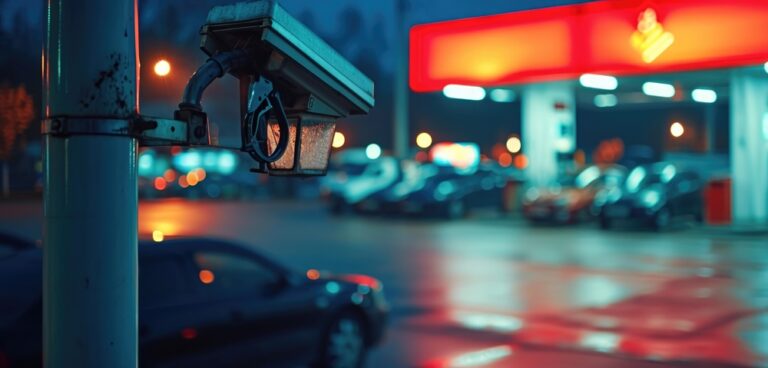As it’s announced that assaulting a shop worker will be made a criminal offence in England and Wales as part of a government response to a wave of retail crime, Alan Stephenson-Brown, CEO at Evolve Business Group, looks at how forecourt operators can harness new tech to combat crime and the key role of connectivity.

The retail sector is notorious for incidents of abuse towards staff, and it’s a problem that’s not going away. In fact, earlier this year it was reported that violent and abusive incidents against shop workers rose by 50% in 2022-23. Separate figures suggest the vast majority (90%) of retail staff have experienced abuse at some point in their career.
Those working in the fuel forecourt sector report the same issues, but here the problem of abuse is particularly unpredictable, with incidents of abuse fluctuating as petrol prices rise.
For fuel forecourt operators, crime is always front-of-mind. In addition to incidents of violent crime and shoplifting, fuel filling stations must be vigilant to the growing number of drivers failing to pay for the petrol and diesel they’ve pumped. Data by the DVLA shows that in the third quarter of 2023, there were 39,563 requests for the names and addresses of vehicle keepers believed to be guilty of fuel theft – a 77% rise compared to the same period the previous year.
With forecourt crime costing fuel retailers around £60 million every year in lost revenue, more operators are turning to new technology to deter criminals.
But forecourt staff face more than just the risk of drivers stealing fuel. In fact, ‘drive off’ from the pump incidents make up just 13% of all fuel crime, with verbal or even physical abuse an increasing problem – as evidenced by the fact BP staff are even now wearing body cameras in stores to help keep them safe.
This issue has been exacerbated as more forecourts are operating a 24/7 service to keep pace with consumer demand. Staffing these sites is a challenge, especially overnight when it is compulsory for employers to provide lone worker protection.
One solution is pay at the pump facilities that leave the sites unmanned at night. Unmanned stations are a practical solution for many fuel retailers, but come with their own set of challenges. The absence of human supervision raises the likelihood of fuel spills, theft and vandalism.
Installing state-of-the-art CCTV monitoring systems allows for remote observation and can alert owners or their maintenance providers to any unusual activity.
The tech protecting fuel forecourts
In the early days of CCTV, it only provided live monitoring, streamed to monitors, without the capacity to record the footage. We’ve come a long way since then. Today, CCTV can provide:
- Real-time feeds through mobile devices and remote monitors.
- Wireless installations available with solar-powered batteries
- Automatic sensors to activate CCTV when movement or breaches are detected.
- Alarm monitoring services provide instant responses when an alert is raised.
Not only do modern surveillance systems allow forecourt operators to access them 24/7 in real time from any device, commercial CCTV cameras can also feature Artificial Intelligence (AI) facial recognition. They capture real-time images of faces to quickly identify individuals, and can instantly identify a face that appears more than once in the captured video footage when played back.
When installing CCTV systems, fuel forecourt operators should follow best practice guidance, including ensuring there is good lighting, minimal blind spots and an active power supply is nearby.
This, combined with automatic number plate recognition (ANPR), will provide a robust and intelligent security system, but it will only be effective with sufficient connectivity.
A stable and fast internet connection is needed for real-time monitoring and remote access of the CCTV feed, but because many CCTV systems now use cloud-based storage solutions to store footage, a reliable internet connection is also needed to ensure seamless uploading of footage to the cloud, preventing any loss of crucial data.
Modern security setups mean CCTV systems are also often integrated with other security systems such as alarms, access control systems, and analytics software. Good connectivity enables smooth communication between these different systems and enhances overall security effectiveness. Plus, of course, good connectivity ensures such high-quality footage can be transmitted without lag or degradation in quality.
Evolve have worked closely with the fuel forecourt sector for many years and understand that fully managed network solutions, including WAN, connectivity, and guest Wi-Fi, are essential for businesses in this sector to operate efficiently and deliver a seamless experience to their customers. But it’s also an increasingly important part of security strategies. Overlooking the connectivity needs of CCTV and other monitoring equipment could prove a costly mistake.

